
Matthew Goode as Adrian Veidt, in a rare photograph of the character that's not awash in purple.
Adrian Veidt (born Adrian Werther Weidt III), also known as Ozymandias, is originally from Alan Moore and Dave Gibbons' graphic novel Watchmen (and the 2009 film version) but is currently played on the Sueniverse by Megan. In-universe, he is the CEO and president of Veidt Enterprises Incorporated, a multinational corporation with stakes in several different markets; a highly respected philanthropist; and one of the world's preeminent martial artists.
Basics
Appearance
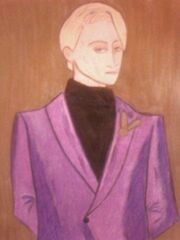
Veidt in his usual purple, floppy-haired glory, as rendered by his Suethor.
Tall, slender (but built enough that he can pick up a gigantic gold floor lamp and hit a man into a fountain with it with no more signs of exertion than gritting his teeth), and apparently eternally youthful in spite of debuting on the 'Verse at the age of 46 (which in Sueniverse years usually means old enough to have been retired to make way for one's offspring's plot taking over), Veidt is usually seen wearing obscene amounts of bright purple with gold accessories. What's even more obscene is the fact that he makes this look good. He also happens to have blond hair with the ability to go from gelled back to floppy in less than a second and hazel eyes that, in the right photograph, have been known to distract his Suethor for nearly thirty seconds at a time. As of recent events, Veidt's right hand is partially artificial.
Personality
Veidt is something of an enigma. To most people, he comes across as warm and affable, and his public persona is almost saintly. However, he's an extremely difficult person to get to know on a level of any depth unless he wants you to; and it's pretty safe to say that he's not exactly one for the sitting down and the discussion of feelings. This may stem from his reputed status as "the smartest man in the world", or it may just be because he is one deep, secretive son of a bitch. He is often demanding and critical, even of those in what passes for his personal circle, which doesn't help that whole " difficulty making friends" issue of his. Most of the time, though, Veidt will deny any need for human closeness to begin with, no matter how deeply he actually rather aches for it. When taken at a disadvantage outside of a situation where he needs to maintain his public facade, he sometimes borders on childishly sulky and moody.
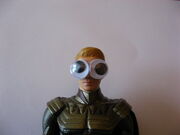
Artist's simulation of Veidt taken at a disadvantage.
While speaking in public or to strangers, Veidt affects an American accent, but he tends to slide into a German one (which, to people who don't recognize that it is in fact German, registers as an accent that MEANS HE IS FROM EVERYWHERE) when with old friends such as Dan Dreiberg or with others he doesn't feel he needs to hide his heritage from (including his ward Micaela Ruth Heekin). In fact, this is pretty symptomatic of any number of things Veidt hides from the world at large- the full truth of his upbringing, his homosexuality (or at least what he tells himself is his homosexuality- it's possible to read some very, um, interesting layers into his interest in Micaela), and another, far darker secret he doesn't share with anyone else at all but will eventually come to light.
Biography
Early Childhood, or, A Goddamn Laundry List Of Circumstances That Makes It A Wonder He Turned Out As Well As He Did
When asked by an interviewer from a television show or a newspaper about his early life, Veidt will simply say that he was born to a pair of German immigrants, Friedrich Werner Veidt and his wife Ingrid Renata, who both died when he was still a teenager. This is basically true, but doesn't give the whole story.
Friedrich Weidt was an officer in the Allesheim death camp (near the Polish border) during the Second World War who had married a young, wealthy woman from the upper classes, Ingrid Kurtz, who only agreed to the marriage in order to protect her fortune. He was a devout supporter of the Third Reich, and something of a sociopath besides, prone to violent fits and abuse at the slightest provocation.
On February 12, Ingrid Weidt gave birth to a son in the officers' village on the outskirts of Allesheim, where the families of those supervising the death and horror of the camp lived in contrasting luxury. He was named Adrian, after his grandfather and great-grandfather. As an infant, he seemed quite normal- healthy, attentive, and crying and sleeping like any other child would. However, Adrian's intellect developed at an almost abnormally fast rate. He was speaking simple sentences at eight months, and had obtained the fluency of a three-year-old by the time he was a year and a half. He grew into a quiet, pensive child, rarely speaking unless spoken to and surprising- often outright unnerving- adults with his intelligence when he did. By the age of four, he amused himself by reading the newspaper with perfect comprehension of the words (if not yet of the ideas) and doing complex arithmetic for fun. His parents noticed the lack of interest he seemed to have in more childish activities and attempted to socialize him with other children, but he remained aloof and better suited to doing things alone.
Ingrid Weidt began to consider the idea that he may have inherited the streak of madness running through Friedrich's ancestry (a fact that lead several mentally defective members of the extended Weidt family to be secreted away to madhouses in order to keep them from staining the family name), but the doctor consulted on the matter came to the conclusion that Adrian was merely so preternaturally bright that it was difficult for him to relate at all to children of normal intelligence. Friedrich, on the other hand, took the dimmer view that his son was an effeminate show-off and began taking steps to try to make him both more obedient and more suited to Friedrich's own ideals. When Adrian disappointed his father, Friedrich beat him or concocted elaborate alternate punishments. Ingrid, also a frequent victim of Friedrich's violent temper, was too frightened of her husband to object, though she did try to make things better for her son whenever his father wasn't around.
When Adrian was four years old, his mother gave birth to a girl named Klara. She did not show any signs of her brother's extreme intellect, but neither was she a particularly robust child, which marked her as an equal disappointment to their father. Adrian was extremely protective of Klara from the time of her birth onward.
When Adrian entered the school run for the officers' children at age five, the problems surrounding his intelligence deepened. After several occasions of being punished for cheating when he'd in fact simply already learned and grown bored with the curriculum, Ingrid suggested to her son in private that he deliberately pretend to be no more advanced than any other child. After some initial resistance to the idea, he gave in and started following her wishes. He didn't relate to others any better than he had before, but at least now he could get by without undue attention.
Adrian and Klara lived, in spite of their unhappy home lives, in a kind of bubble, kept willfully unaware of what went on at Allesheim outside of the officers' village. This all changed when Adrian managed to jump the fence and witnessed the true nature of Allesheim for the first time. At only five years old, he was small enough (and given his abnormal level of intellect, intelligent enough) to avoid immediate detection by the guards and wandered through scenes of nearly unimaginable horror until his terrified mother arrived and carried him back home to tuck him into bed. She initially insisted that Adrian had had a nightmare, but Friedrich responded by deciding to take his son on a "little tour" of the camp, pointing out in detail what the inmates' badges meant and showing Adrian the gas chambers and crematorium. The boy was understandably traumatized for the rest of his life, which would later prove to have devastating consequences.
A year later, Adrian fell victim to a fever, which Klara soon contracted as well. Both children suffered for some time, but ultimately Adrian survived. Klara, however, did not.
When the Third Reich fell, Friedrich Weidt took his family with him into hiding in Switzerland, where they stayed until he deemed the situation too dangerous there as well, and announced that they would be emigrating to the United States.
Teen Years
Adrian was twelve when the family arrived in New York. Friedrich had the family name changed to the more phonetic Veidt to distract suspicion. Adrian was enrolled in an unexceptional Manhattan high school (though evaluation from the headmaster ensured that he skipped a grade). Several of his classmates were considerably poorer than he was, the children of laborers in factories and meat-packing plants. He began to develop a passion for one day taking away the need for hard labor and squalor to support the upper classes, as well as of eliminating evil such as that which his father supported. He learned English very quickly, and as he grew older and into what his teachers and classmates saw as the perfect all-American boy, he simultaneously began to openly challenge and mock his father at home as well as in public. Friedrich's always-evident instability had by now soured into alcoholism and longing for the days when in his view he "was something", and Adrian took every opportunity to berate and humiliate his father. They frequently came to blows, and Ingrid could only stay out of the way.
In his sophomore year, Adrian joined his high school's baseball team and quickly managed to become its star player, leading them to the national high school championship. It was his first brush with fame, and he handled it with the same calm poise he'd later demonstrate as an international celebrity.
What Adrian was still missing was someone to whom he could feel any kinship, any relation. He felt a certain degree of filial affection for his mother, but couldn't respect her silence in the face of her brutal husband, and while he had had a number of secret trysts with boys from school (kept dutifully secret from his family, and indeed the world at large), these connections were purely physical, engaging neither his emotions nor his intellect. It was only his chance discovery of a biography of Alexander the Great, left abandoned on a cab he took home one night, that awoke any sense of oneness within him.
Alexander became Adrian's obsession on nearly every level- as a rival to aspire to, as a historical precedent to follow, and even as a romantic ideal. As Friedrich Veidt lay dying of what was eventually diagnosed as cancer, his son was developing a grandiose plan to unite the world as Alexander had tried to do-not through conquest of foreign lands, but through the elimination of all that stood in the way of universal brotherhood and peace.
However, the dark side of Adrian's devotion to this ideal also surfaced at around this same time. Tired of having to put up with his father's abuse and of watching his mother slowly crumble, sixteen-year-old Adrian murdered his father with an air bubble injected into the older man's morphine. Friedrich Veidt's vastly compromised health assured that no investigation into his death took place.
Adrian was sickened with himself for being willing to stoop to murder, but he rationalized it to himself as having rid the world of a monster. Nevertheless, this engendered in him a strongly pacifistic moral code that he would not feel compelled to break again until well into adulthood, when global circumstances reached a point where he felt he had no choice.
Costumed Adventuring and Other Important Choices Based On Things Seen While High on Hashish
Ingrid Veidt passed away when Adrian was seventeen, shortly after his graduation from high school. She left him with a substantial fortune.
Not wanting to be associated with what he saw as his father's tainted money, he kept only what was needed to fund his a specific project he had in mind and gave the rest to charity. He turned down the contract the New York Yankees had offered him based on his high school baseball record, and set off for Alexander's domain, starting in Egypt.
Once he made it ti Turkey, he purchased a ball of hashish out of curiosity and then nearly forgot about it until he consumed it one night in the desert. The resulting visions from his high convinced him that he needed to use an unorthodox means of changing the world- disguising himself and doing good anonymously. He took Ozymandias, the Greek name of the pharaoh Ramses II, as his alias, and returned to America.
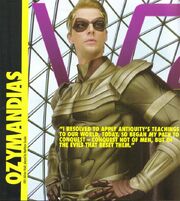
Veidt in full costume as his vigilante alter ego Ozymandias
Once he was back in New York, Veidt began his career as Ozymandias while continuing a string of odd jobs to support himself on, meanwhile becoming familiar with the author William S. Burrough's particular writing method, called 'cut-ups', in which a series of paragraphs would be cut into their component sentences and then rearranged in random order, occasionally with new meaning arising from the fresh context. Veidt found this method of finding scraps of extremely telling order in the midst of chaos appealing, and developed a method for gathering information about the collective consciousness of society based on this idea. He began reading every magazine he could get his hands on, watching every broadcast, and looking for recurring themes that provided insight into the state of the economy and the minds of the American public. He then parlayed this knowledge into making money on the stock market, until he had enough money to begin putting himself through early-morning courses at the University of New York's School of Commerce, Accounts and Finances.
Veidt's extremely accurate finger on the pulse of the American mindset allowed him to make enough simply from the stock market that by age twenty he was able to purchase a small manufacturing concern in West Orange, New Jersey. By 1961 (the same year he earned his doctorate in economics, awarded early by a college faculty that realized after putting him through comprehensive testing and retesting that he was already more advanced than many of them, purely through his own merits, and that trying to teach him anything else would waste their time), he had developed a cordless telephone that allowed the speaker to move within three hundred yards of its base in any direction without losing signal. In 1962, as Ozymandias, he first encountered Dr. Manhattan, and in public life he started expanding his holdings to encompass a far broader range of products than merely electronics. By 1964, Veidt Enterprises had become a major player in the business world. Memories of his classmates ensured that he became a tremendously fair and conscientious employer, loved and respected by those who worked for him. His work began to publicly spread into the philanthropic sphere as well, and he began making numerous large endowments to charitable foundations. That year also saw the establishment of the Adrian Veidt International Scholarship Fund, for students entering college to study business, law, engineering, or historical studies. His contributions to archaeological and anthropological studies, both monetary and academic, earned him an honorary doctorate in anthropology.
Veidt's activities as Ozymandias were meanwhile earning their own separate headlines. Rather than focusing only on relatively simple crimes such as robberies, Ozymandias became famous for breaking up drug rings and taking down large swathes of the Mafia. The fact that he generally worked at night and allowed his German accent through while "in character" managed to prevent most people from figuring out who he was, even if it was otherwise fairly obvious that Ozymandias was Adrian Veidt with a mask spirit-gummed to his face.
The GeneCo Era
It was at around this time that he made the acquaintance of GeneCo magnate Rotti Largo, who became a mentor figure to him. Together, Veidt and Largo began working on a cure for the organ failure epidemic that was decimating the human race. Largo also provided Veidt with the technology to bioengineer a mutant lynx, which Veidt named Bubastis, and the ability to clone several prehistoric animals as exotic pets. The furthest this latter project ever got was the creation of a few frozen embryos- Veidt was too busy funding the construction of a hi-tech research compound/shrine to the ancient world/mansion in Antarctica that he called Karnak.
In late 1965, Veidt was summoned back to Europe by a geneticist named Anna Kochner, whom he had known in school in Allesheim when both of them were still children. She claimed to have found some disturbing correspondence between their fathers that she wanted to discuss, but the effect of their reunion took an unexpected turn and developed into a sudden affair in which more important matters were left to the wayside. In spite of their chemistry together, Veidt and Kochner did not fare particularly well at getting along, and after a particularly intense clash Kochner destroyed the evidence of what she intended to tell Veidt, and he returned to America. Three weeks later, Kochner discovered she was pregnant, but still chose not to inform Veidt.

The Crimebusters. Left-to-right: the Comedian (Edward Blake), Silk Spectre II (Laurie Juspeczyk), Dr. Manhattan, Ozymandias (Adrian Veidt), Nite Owl II (Dan Dreiberg) and Rorschach.
As Ozymandias, Veidt was recruited to join a new superteam called the Crimebusters, consisting of himself, Dr. Manhattan, the Comedian (Edward Blake), Nite Owl II (Dan Dreiberg), Rorschach, and Silk Spectre II (Laurie Juspeczyk). While they never became the synchronized squad the original organizer Captain Metropolis had wanted, the superheroes did stay in contact with one another and occasionally worked together, until the tragic death of the seventeen-year-old Silk Spectre permanently fractured their dynamic. Ironically, a cure for the disease that killed her was discovered only months later, and soon after that Veidt and Largo dissolved their partnership due to a personal conflict. After their falling-out, Largo insituted an organ repossession policy (having implanted organs carved out of their recipients and returned to GeneCo if they were not properly paid for, a usually fatal process for the recipients of the organs). This proved to be the final, irreparable rift between Largo and Veidt, and from then on the two men and their respective companies became bitter rivals.
Retirement Into Business
Veidt became powerfully aware of the futility of fighting evil on a street-level scale, particularly after he assisted in the investigation of an East German boys' orphanage that had fallen victim to a mass suicide save one child. Within a few years, he ultimately revealed his identity and retired from costumed adventuring to become a full-time industrialist and philantropist at age 36. His first major act of non-superheroic public good will was serving as a sponsor to the recently orphaned twin children, Johan and Anna Liebert, of an East German diplomat who was murdered along with his wife when they came to seek political asylum in New York. Anna was catatonic from psychological shock and Johan had himself been shot in the head during the attack, leaving the boy with a severely damaged skull. Veidt swallowed his pride and asked Rotti Largo to provide surgery for the child, but after a blood test to see if Veidt's blood was compatible with Johan's, Largo abruptly cut off his support, leaving Veidt to seek less miraculous cures. He decided that he would adopt Johan and Anna himself to protect them financially and hire a full-time nanny to offer them the parental support he himself would be unable to give, but by the time he returned to collect them, the twins were gone.
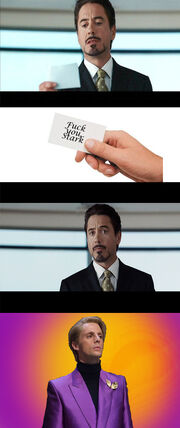
Megan is still disappointed that this will never happen.
By now, Veidt was the only onetime vigilante to stay in the public's good graces after the passing of the Keene Act banning superheroes in America. He continued to garner strong public support, and eventually received another honorary doctorate, this time in classical philosophy. His reputation remained somewhat apart from the rest of the group he had once belonged to, and he was therefore able to use his costume for publicity. The Ozymandias name was still used at showcases on Veidt's part of gymanastic skill undertaken for charity, on action figures. His signature purple-and-gold color scheme made its way to perfume bottles, sportswear, cosmetic labels, completely portable telephones. He had gone from simply selling what people wanted to selling his own image.
The Plan
However, Veidt was also funding a secret plan of his own. With America and the USSR coming closer and closer to nuclear war every day, and the "doomsday clock" created to gauge just how close humanity lingered to extinction coming closer to midnight, Veidt had become fixated upon what he saw as his duty to save the world from itself. The seeds of this were laid in the late 1960s, when he first became convinced that costumed heroism was doing little good to alleviate the suffering of mankind at large, but when he retired it became his secret priority. He began looking for possible methods that could force the world into abandoning its warlike ways and push forward into what he hoped would be a progressive future, and eventually decided that the only possible way would be to frighten it into submission. This would be accomplished through the use of a power that would emulate the what one might call the wrath of God to create a highly visual catastrophe, to serve as a "warning" of what might happen to the rest of the human population if they continued on this path. Veidt began developing a power source that would allow this to happen, but he needed something capable of instantaneously teleporting the raw destructive energy to its intended target. He also laid down precautions that would divert any apparent guilt away from himself and toward GeneCo if the matter were investigated. It was in this desperation that the first victims of Veidt's obsession died, including Scaramouche, a young, disturbed employee of Veidt Enterprises who discovered his plan and was killed by Veidt himself in the guise of one of GeneCo's Repo Men. She was presumed by the authorities to have been murdered by GeneCo for her connection with Veidt.
The Perfect Heir
After a decade of increasing worry and frustration at failed teleportation devices, Veidt met a young girl named Micaela in Paris, after she miraculously teleported an entire crowd out of harm's way.
He had his teleporter- and an heir to see his new world through in case something happened to him. All he had to do was convince her to join him, and he was able to by offering to put her through college in exchange for her loyalty. At the same party he threw in her honor (and to convince her), Veidt first became acquainted with Adrien Baillon, a beautiful young rentboy and sometime drag queen, whom he took a liking to and decided to keep around as a sexual partner and Micaela's personal assistant.
Micaela became a frequent presence at Veidt's board meetings and the like, and he played up their relationship to the press by taking spoiling her like a fond father. After a visit to the Genetic Opera to see Blind Mag perform, Veidt took Micaela backstage to meet the diva, and instead the pair found Pavi Largo attempting to rape her. Veidt saved Blind Mag, and when Pavi returned with his father, Veidt met privately with Rotti Largo, purchased Blind Mag's eyes and contract, and then destroyed the latter while allowing her to keep the former, thus ending her obligation to GeneCo.
Going Into Action
Veidt took advantage of the newly escalated ill will between himself and GeneCo by taking out a repo hit on himself through a third party. A few days after the purchase of Blind Mag's contract, a GeneCo operative arrived armed with a gun as Veidt, Micaela, and a number of toy executives were leaving a meeting. In the ensuing chaos, Veidt's secretary Melissa was killed, and Veidt's own right hand was severely damaged by two successive bullets, which blasted off the first two fingers and his thumb when Micaela tried to stop him from what she thought was taking a bullet for her (he was actually attempting to "catch" the bullet, a skill he had practiced to acquire).
Veidt's hand was rebuilt with an experimental biomechanical prosthetic implant at Karnak, where he began to intensify Micaela's training to be his heir at the same time the girl was beginning to feel doubts and distance from him. During a visit from Micaela's friend Megan Renée and Dan Dreiberg, Micaela's feelings came to a head, and she fled the dinner table after an angry outburst regarding Veidt's flippant lack of concern for her parents and family life. Later that night, while looking for her, Veidt instead overheard her speaking to Adrien Baillon, and saying that she really just wanted to go home again. By now Veidt was nearly obsessed with keeping her to succeed him, and this did a fair deal toward souring his affection toward her into jealous possessiveness.
Back in Paris, a great deal of his attention was turned to Baillon (see below) instead, while he continued forcefully preparing Micaela for her role in his scheme. But Veidt landed in a situation he hadn't bargained for: falling in love with the boy.
Everything Starts Going To Hell
For a few short weeks, life was as close to balanced as it had ever been for Adrian Veidt. Baillon provided a welcome occasional respite from serious concerns and Micaela was gaining full control of her abilities. However, the nature of Veidt's ultimate goal meant that he increasingly disliked the idea of Baillon having to know what Veidt had been doing, and he went so far as to nearly poison the boy before realizing that he had found someone whose blood he was unwilling to spill for his new world.
Things became even worse when Micaela abruptly vanished. What began as a kidnapping investigation soon turned into one for homicide, until it became apparent that there were no more leads to turn up. Veidt's realization that he had grown to genuinely care about Micaela combined with a setback big enough to destroy his whole masterstroke drove him to the brink. All of the relentless perfecting he'd forced on Micaela now turned to Baillon, who in turn began to feel unloved and manipulated.
These feelings came to a head during a business trip to Romania. After being refused a dance himself, Baillon saw Veidt partnered with Mrs. Magda Snape in a waltz at the costume ball that formed the social center of the business summit, Baillon slept with Mrs. Snape's close friend Crowley and nearly left Veidt when he was found out. Only a humbled, reckless admission from Veidt changed his mind, though he still returned to Paris sans Veidt to clear his head.
While Baillon was away, the increasingly scattered and desperate Veidt was visited by an old friend- the being named Dr. Manhattan. Manhattan took Veidt with him to the surface of the planet Mars, where Manhattan explained that he had grown tired of Earth and was planning to leave for another galaxy very soon. Veidt, instead, asked Manhattan to serve as the ultimate executor of Veidt's bid to save humanity. Manhattan instead offered to take Veidt away from Earth, leaving the world to its foolishness and destructive ways, and the idea of perhaps letting the world burn was strong enough to make Veidt momentarily consider simply holing up in Karnak with Baillon while the rest of humanity suffered. But Veidt rejected this idea, swallowed his disgust with the blood that was already on his hands, and asked Manhattan to attack the crowd at Times Square in New York the following New Year's Eve, so that the victims would die on-camera during the broadcast of the celebration and could stand as a warning to everyone else.
Upon returning Veidt to Earth, Manhattan asked Veidt for a kiss, as a final sign of closeness to the human condition that Manhattan was giving up. Two days later, Veidt reunited with Baillon, and the countdown to Veidt's ultimate coup began.
Relationships
Dan Dreiberg
Like Veidt, Dan Dreiberg is a retired costume adventurer. Dan fought crime under the alias Nite Owl (a name he acquired from his idol Hollis Mason, the first Nite Owl) and was a friend of Veidt's both when he knew him only as Ozymandias and then later when they made their identities known to one another. This relationship continues to this day. The rather sweet and unassuming Dan manages to still come off as an adorably bewildered, innocent nerd, a quality which has aroused romantic interest in Veidt's ward Micaela Heekin.
Micaela Ruth Heekin
Gifted with extraordinary reality-warping powers, Micaela came to Veidt's attention when she saved him (and a whole crowd watching him) from a runaway car by teleporting the whole mass of people three blocks away from the car. Veidt immediately began offering to let her become his ward (in spite of already being almost eighteen years old) and heir to his fortune, but she did not accept his invitation until he threw in the bonus promise that he would pay for her tuition to any college she could get into.
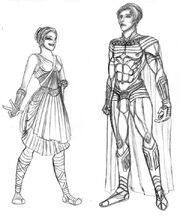
Micaela as her fictitious alter ego Meritites, alongside Veidt as Ozymandias.
Micaela was viewed by the public as the daughter Adrian Veidt never had. She physically fit the role, with blonde hair, blue eyes, and pretty features. But the resemblances also ran more than skin deep, for she also had an extremely high IQ and a long-standing interest in the ancient world. Veidt tried to shape her into almost his small female doppelganger through providing her with clothes in his usual color scheme and giving her her own genetically enhanced pet, a cave lion cub she named Moo (short for Mufasa). However, the extreme pressures Veidt put on her took their toll on their relationship, causing her to seek distance from him, and her mysterious disappearence (still under investigation) ensured that they would never have a chance to heal the rift.
Bubastis

Bubastis.
Bubastis is Veidt's genetically enhanced pet lynx. Far larger than a wild lynx and much more intelligent, she is also purple (as though Veidt would have it any other way) and has extremely long, tufted ears. She is capable of reducing Veidt to nearly babytalking his affection for her, and enjoys privileged status within his organization. Veidt takes her with him on nearly all of his travels and doesn't shoo her from the room while he entertains rentboys, a fact that has provided endless amusement to Megan and Sarrin.
Bubastis is the main focus of the "Adrian Veidt's Pecadilloes" section of the Watchmen "It Just Bugs Me" page on TV Tropes. This is unimportant, except for the fact that Megan really, really likes that they apparently needed a section called "Adrian Veidt's Pecadilloes".
Adrien Baillon
A young rentboy and hooligan also known by the nom de drag Notre-Dame-des-Fleurs, Adrien Baillon became fascinated with Adrian Veidt after Baillon's roommate Divine jokingly implied that a photograph of Veidt in the newspaper was of the similarly named and loosely resembling Baillon. He managed to gatecrash a party Veidt was holding in honor of Micaela's birthday, and was astonished to be picked up for the night by Veidt himself.
Slash ensued, after which Veidt embarrassed Baillon by giving Baillon far more money than had been the requested payment, and then frightened the boy by growing irritated at his reluctance. Veidt relented, and then offered instead to hire Baillon as Micaela's personal assistant in order to not force the boy to return to a life of prostituting himself on the streets. Baillon accepted, and began spending his days doing tasks for Micaela and his nights in Veidt's bed.
Over the course of several months, Veidt and Baillon's relationship deepened considerably, to the point where neither one could quite take being without the other. Veidt eventually invited Baillon to his private penthouse for the weekend, and ended up becoming drunk and admitting that he had fallen in love with the boy. Baillon did not believe him at first, but over the course of the weekend it became clear that they were indeed a romantic couple and not merely a pair of casual sex partners. From then on, they began to spend most of their free time together, albeit with Veidt taking measures to not destroy his public image by being seen with a boy he was very obviously emotionally involved with.
The relationship between Adrian Veidt and Adrien Baillon is somewhat complex. The fact that it was only through a sexual encounter that Veidt thought to hire Baillon in the first place means that in many ways, Baillon has merely traded in the life of a lower-class rentboy for that of a comfortable, well-fed kept boy. However, Veidt genuinely feels that he is doing Baillon a favor (though a twinge of doubt was expressed when Veidt grimly and self-deprecatingly asked Baillon to think of him as "your guardian angel"; and similar moments that continue to occur with unnerving frequency). Baillon, meanwhile, is utterly fascinated by and infatuated with Veidt, and still stunned by his good luck. Veidt's obsessive need to monitor and control others has had a slightly damaging effect on even this relationship, though, and the stress is starting to show on Baillon, who has gone to such extreme lengths as offering to live as a girl to protect their love (a measure that was instead angrily rebuffed by Veidt, to say the least).
Rotti Largo
In spite of their current very obvious mutual hatred for one another, Rotti Largo and Adrian Veidt were once close friends and business partners who worked together for the betterment of humanity in the wake of a huge epidemic of severe organ failures. The much older Largo viewed Veidt as a refreshing change from his own disappointing son Luigi Largo (Pavi had not yet grown to be an equal failure in his father's eyes), while Veidt (who was at this point less than thirty years old and something of a youthful idealist) saw in Largo the approving, guiding father figure Friedrich had never been.
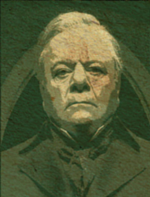
Rotti Largo
However, everything changed when Veidt introduced Nathan Wallace, a young doctor of strong promise, to Marni, Largo's fiancée. Nathan and Marni soon fell in love, and Marni left Largo for Nathan. When Marni was pregnant with Nathan's child, a revenge-crazed Largo had her murdered and Nathan framed for the crime. Nathan was soon blackmailed into becoming GeneCo's first Repo Man.
When Veidt offered his condolences over Marni's death to Largo (without knowing Largo was responsible), Largo instead accused Veidt of having intentionally planned Marni's betrayal, and a shaken Veidt broke off their partnership. The rift became permanent when Veidt found that Largo was pushing a bill authorizing organ repossessions from defaulted GeneCo clients through Congress. Veidt publicly denounced Largo as both a businessman and a human being, and made it clear that his ruination would be Veidt's pleasure.
Dr. Manhattan
Once a young, brilliant physicist, Jon Osterman- along with the course of human history itself- was irrevocably altered in a horrifying lab accident. Osterman's body was ripped apart into its most basic component atoms, but his consciousness survived and reformed into a humanoid energy being that the United States government dubbed Dr. Manhattan. Even in a world full of vampires, practitioners of magic, zombies, and other supernatural elements, Manhattan was something different- something almost like a god. Almost alien in appearance, he possesses the ability to be in multiple places at the same time, can shrink and grow indefinitely, can explode or completely destroy matter with a wave of his hand, and sees all moments in time simultaneously.

Micaela as her fictitious alter ego Meritites, alongside Veidt as Ozymandias.
Since his transformation, Manhattan has needed company to keep him even remotely anchored to humanity. The first was Dr. Janey Slater, a fellow physicist who was Osterman's lover at the time of the accident and Manhattan's afterward. The second was Laurie Juspeczyk, a girl in her late teens who was part of the Crimebusters initiative as the second Silk Spectre, who became Manhattan's lover after he left Dr. Slater. Following Laurie's tragic death in the organ failure pandemic of the late 1960s, Manhattan became detached from humanity at an increasingly rapid pace, with only his work with the government (including conquering Vietnam in 1972) and his interest in Veidt to keep him from popping off to Mars all the time.
Veidt presents a fascinating challenge to Manhattan, who considers Veidt rather apart from humanity in his own right. This is something Veidt strongly agrees with in some ways and tries to ignore in others. Manhattan's constant placid reminders that the pharaohs of the past that Veidt so idolizes were as unlike Veidt as any modern men, along with offers to simply take Veidt away from a world that doesn't understand him, are powerful, frightening temptations.
Eddie Blake
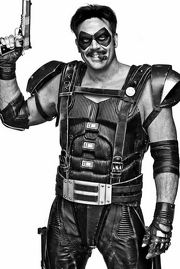
Edward Morgan "the Comedian" Blake.
The man who called himself the Comedian was a crude, cynical, vicious yet oddly perceptive thug of a vigilante, and a thorn in Veidt's side from their very first meeting, in which the older superhero found Veidt patrolling New York City as Ozymandias when Veidt was only eighteen years old. He proceeded to beat Veidt nearly senseless, and then threatened to curbstomp him unless Veidt "admitted" to being worthless, with nothing to offer the world and no way of succeeding at anything, which to Veidt was even worse than if Blake has chosen to violate him sexually (the Comedian's usual M.O. for "dealing with" upstart young vigilantes). Veidt said exactly what Blake wanted to hear, but the incident remained a darkly formative experience for the young hero, and the animosity carried over to their later animosity as occasional crimefighting teammates. Following the death of the young superheroine Silk Spectre II, Blake managed to land another blow to Veidt's face- and his pride- and neither of them have seen one another since that day.
However, Blake's blunt understanding of the worst parts of human nature, including Veidt's, have lingered in Veidt's mind to the point that the hallucinations he experiences from time to time thanks to the medication he has been using to stimulate nerve growth in his damaged hand tend to take the form of a jeering Blake offering commentary on Veidt's life. The hallucinatory Blake voices things that Veidt would never allow himself to consciously think, and while Veidt knows fully well that Blake isn't really there, he's as frustrated by him that he might as well be.
Laurie Juspeczyk
The second Silk Spectre (daughter of Sally Jupiter, the first woman to use that alias, and secretly of Eddie Blake) was one of the trio of teenage heroes that formed half of the group that patrolled New York in the last two decades before the Keene Act was passed. Spunky, friendly, and able to give as good as she got, even in an otherwise all-male group, Laurie was more or less the heart of the team- and as the lover of the older, distant Dr. Manhattan, an important tether for humanity at large. Her sudden, violent death in the organ failure epidemic of the 1960s marked the end of any real cooperation between any of the other vigilantes except for perennial partners Nite Owl and Rorschach, and cemented the rift between Veidt and Blake. Veidt's desperation to save her with the experimental cure he had on hand lead to him repeatedly stabbing her body with injections that would render her permanently disabled even if she revived, and Blake attacked him and dragged him off before breaking down over the body of the girl no one but Blake and Jupiter knew to be Blake's daughter. Veidt hurried Rorschach and Nite Owl out to protect them from Laurie's possibly contagious corpse, and never followed up to find out what had happened to Blake afterward, thus spelling the end of the already loose partnership.
Trivia and Random Facts
- He possesses an IQ of around 235.
- He is functionally ambidextrous.
- Veidt has surprisingly low alcohol tolerance, and by surprisingly low, I mean "scarcely any". He very, very rarely drinks; and when he does, he has to do so very slowly or else he falls headfirst into extreme drunkenness.
- He almost never shows his teeth when he smiles, even though he has good teeth. Smiling does not, in fact, come very naturally to him at all, and neither does laughing. When he laughs out of genuine amusement, it comes out both sharper and less composed than the laugh he affects to give the impression that he's amused.
- He has frankly rather bizarre and eclectic taste in music, with a particular fondness for experimental orchestral pieces, as well as electronic music (ranging from essentially atonal works to what might be considered "techno-pop") and a smattering of classical and opera.
- The Ozymandias costume he wore at the time of his retirement was actually the second iteration- in the first year of his career as a superhero, he wore a homemade purple-and-gold costume that offered little protection and forced him to perfect his defensive skills.
- He is an extremely proficient pianist, but his playing lacks any artistic warmth or virtuosity. The same can be said about any drawings he produces- they are often technically perfect but have a sterile, carbon-copy feel to them.
Less Serious Business
Running Jokes
Veidt has been the subject of a few running jokes, many of which originated outside the Sueniverse.
Fierce
According to Urban Dictionary, fierce is "a word used by two fashion divas, Tyra Banks and Christian Siriano. It is used to describe someone or something that stands out from the crowd for all the right reasons. It gets noticed."
And from the very start of the film fandom for Watchmen, it was a word that became permanently associated with Adrian Veidt, particularly by female fans who enjoyed basking in the purple glow of movie!Veidt's Eighties-flavored awesomeness. Which brings us to the next running joke:
BOYS
In the graphic novel, Rorschach suggests that Veidt is "possibly homosexual", but no concrete evidence is given to suggest Veidt being interested in either men or women. In the movie, on the other hand, this little Easter egg was featured on the desktop of Veidt's computer:

No, really. Adrian Veidt apparently keeps gay porn on his computer.
"Suck my dick, I don't give a fuck"

Megan the Suethor models her comic!Veidt mask. He, uh, was a lot beefier in the graphic novel.
Matthew Goode was the last addition to the Watchmen film cast, and this news did not sit well with many fans of the graphic novel. After all, there is very, very little physical resemblance between film!Veidt and comic!Veidt (and even less between Matthew Goode in out-of-character mode and comic!Veidt), and die-hard graphic novel purists are not as easily won over by eyes one can get lost in and fierce German accents, especially when these attributes come from an actor some twenty years younger than the character he's playing, as the average fangirl. But Goode grew tired of the nitpicking and complaining, and finally voiced his sentiments in a profanity-laden statement to The Sun in Britain:
"The negative feedback is relayed by my friends. I think the fanboys aren't particularly happy - there are a load of people they'd have rather had in before me. But if fanboys still hate the film after going and seeing it, they can all line up and suck my dick. I don't give a fuck. I'm having a child and that's more important to me - so I don't give a fuck. Grow a dick."
And thus, yet another running joke was born, along with a quote that Matthew Goode will probably never, ever be able to live down.
(However, it's unknown what those fanboys in question would have thought had they know that one of the main contenders ahead of Goode was Tom Cruise. No, really: Tom fucking Cruise. How weird would that have been?)
Incidentally, this article has more cursing per square inch than anything else on this wiki. Perhaps we are just making Matthew Goode proud.
Cheeky Antarctic Ice Palace
Matthew Goode's apparent pet name for Karnak. It's not a running joke yet, but fuckdammit, it should be.
The Rocky Horror Picture Show
Megan has a new hobby of trying to see how many of Dr. Frank N. Furter's lines from The Rocky Horror Picture Show she can force out of Veidt's mouth without making it obvious or being out of character. This may work easily for comments such as "Even smiling makes my face ache", but readers shouldn't count on him ever asking anyone to come up to the lab and see what's on the slab. Sometimes, even Megan has limits.
LINES USED SO FAR:
- "But since you're such an exceptional beauty, I'm prepared to forgive you."
Links
- ontd_ozy, a LiveJournal community devoted to the, um, crackier sides of the Veidt fandom: http://community.livejournal.com/ontd_ozy
- veidt_fans, another, less cracktacular community: http://community.livejournal.com/veidt_fans
- A large collection of Veidt pictures ranging from the serious to the ridiculous: http://s177.photobucket.com/albums/w218/MeganPhntmGrl/Ozymandias/
- The Veidt article on Watchmen Wiki (warning: contains spoilers): http://watchmen.wikia.com/wiki/Adrian_Veidt

